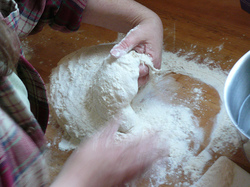Ingesting raw yeast bread dough can pose a significant health risk to pets

As benign as this looks, raw bread dough can kill your pet.
flickr photo by grongar
Baking is a long-held tradition during this last stretch of each year. While homemade sweet and savory treats from your oven are a welcome sight from loved ones, their only worry might be their expanding waistlines.
But when it comes to your culinary alchemy, a little-known danger exists for your four-legged friends that you may have never thought of: raw yeast bread dough.
The idea of pets eating raw dough and becoming sick — whether it's homemade or the frozen store-bought variety — is often thought of as an urban myth, but be assured that if it happens, doing so can cause serious health risks that need to be taken seriously.
The curiosity of a dog or a cat can often get them into trouble, so care needs to be taken to safeguard their health, which can be compromised in two ways.
For starters, problems in the gut can occur in either species, even if it's a small amount of raw dough.
The problem: as the combined ingredients work their magic when proofing at a warm room temperature — usually a cloth-covered bowl on a counter top — the dough rises and expands.
Guess which environment is very much like that? An animal's stomach.
Once in the stomach of a cat or dog, the dough continues to rise, and can cause bloat, then lead to a condition called gastric-dilitation volvulus (twisted stomach) and even a bowel obstruction.
Signs of these problems are vomiting, retching that isn't productive, behavioral changes, vocalizations, a distended stomach, weakness and even collapse.
A secondary problem is one that you might not expect: the fermenting yeast produces alcohol, which enters the animal's bloodstream quickly, leading to alcohol poisoning.
Symptoms include: lack of coordination, staggering, lethargy and drooling/nausea. Seizures can also occur.
Simply because pets are naturally curious, and raw bread rough does have a smell that is pleasing to dogs and cats, take special care when working with raw yeast dough to keep them away.
If you suspect that your pet has eaten even a small amount (even a golf ball-sized portion can kill a cat), call your clinician or emergency veterinary clinic immediately, as surgery may be necessary.
Click here to read more about this little-known risk.
Lorrie Shaw is lead pets blogger for AnnArbor.com. Connect with her on Google+ and follow her daily adventures as a professional pet sitter or email her directly.


Comments
julieswhimsies
Wed, Nov 23, 2011 : 9:44 p.m.
Bree would absolutely eat that! Thanks for the heads up!